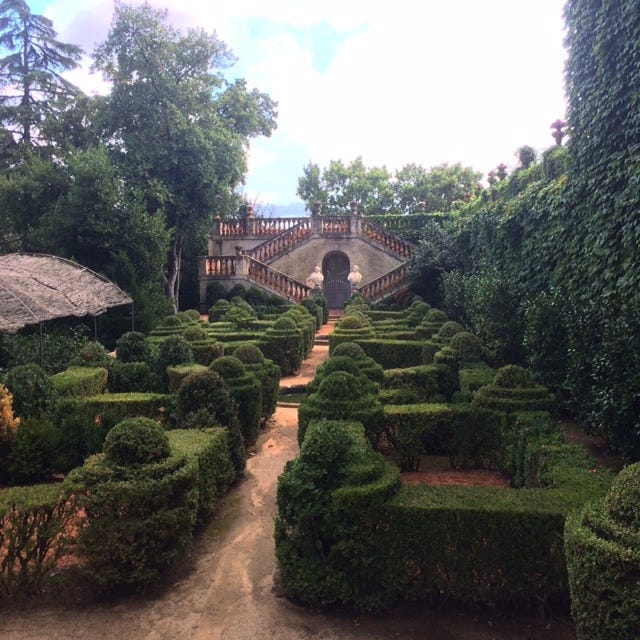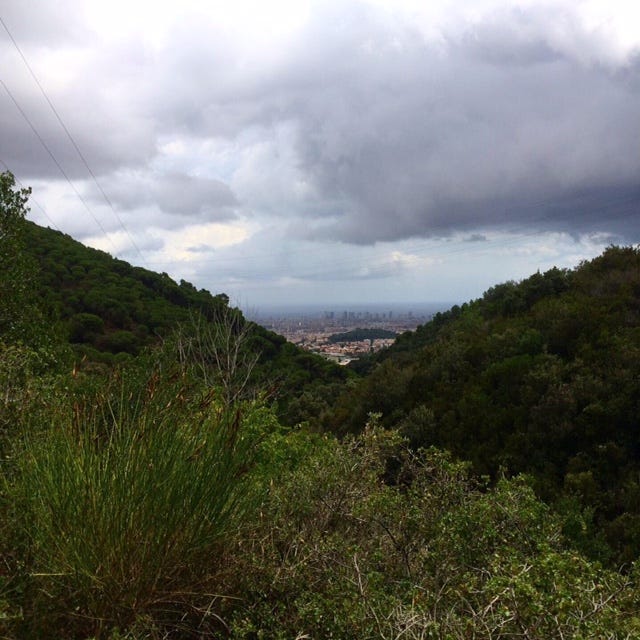
The start of the hike was suggested as the back end of a small park. We set off, foolishly, without a map, just a few verbal descriptions and a bag of pasta and fruit and water. This, we decided, was an adventure. It was blue, the sky, before we left.
At the opening of the park was set a noble house. At the centre of the house, an ancient tower; 12th century perhaps, a defensive fortification from when the Ronda de Dalt, the large highway, didn’t run past its door; bandit country, up here in the Hebron Valley, where the steep ravines filled with thick pine and broad-leafed ferns, where little springs and dogs and men can hide from the sun.
Around the tower was built the noble house, and around that its neoclassical gardens. They became the first in the city, as yet not stretched contiguous to their walls, and the Desvalls Marquises who built them laid out a formal vista back from the house; low hedges, high steps, fountains and statuary. The air was noticeably cooler than it was even a few weeks ago, and seemed to be rushing up from the sea, or maybe down from the mountains that rose from the back of the park. I was preoccupied with the news, as I had been for the past few weeks; the ever-rolling news. Back in Britain the country seemed to be slipping further into crisis, but the strongman stance of the new Prime Minister seemed to be falling apart. He had announced the prorogation of Parliament, only to be humiliated at the despatch box. It seemed as he gripped power harder, he suffocated it, leaving it to dry up, turn brittle, desiccate in his hands. I had a bad feeling about the near future; Britain seemed gripped by a sort of fragile machismo, impelled to act for the sake of action, even as the consequences were as inevitable as they were fatal. Just fucking do something looked more and more like a provocation to a terrible authoritarianism.

As we walked around the old house, its grandeur now not just faded but falling in through the roof, we felt a strange double-sense around us. Young children were playing, running through the planned, formal gardens in their little velcroed sandals, encouraging each other into ever bolder feats against dragons I couldn’t for the life of me see. Yet the barred windows of the old house did unsettle me, their windows smashed through and the darkness of the cellar seeming to glow out, like inverted sunlight. I averted my eyes from it as we scuttled past. What would happen next? I felt strangely isolated from London, a city I’d been in barely a fortnight prior, by the emotional distance that living away from your homeland can cause. I kept abreast of the news feverishly; I had read little else all summer, not that I could remember. Save for a sad story I read in a journal on the metro up to the gardens, of a young airmen downed over enemy lines in the last months of the Great War, and his mother’s quest in the decades that followed to contact him through spiritualist mediums, a form of grief and emotional isolation I felt the article’s author dealt with sensitively, with compassion, never erasing the meaning of spiritual contact with a crude scepticism. I checked the date of the journal; November 2018. How had I missed this essay when it had arrived almost 10 months prior? Have I been so busy?
Deadlines seemed to be pressing against the national parliament; polling looked woeful for the socialist party, whose renewed shift towards the left I had followed closely and enthusiastically. It seemed evident to me that the press campaign against him over the past 4 years had been driven by little more than bad faith; how could people who knew implicitly that the British media were beyond scurrilous, beyond partisan, in all forms, were somehow honest brokers of information in this situation? It took me a long time to realise why. Behind the house was a hedge maze, a labyrinth whose guides, in the shape of a frieze by the entrance and a sculpture at the centre, retraced the mythical tale of Theseus entering the Minoan labyrinth to slay the Minotaur. The hedges rose well above the head. We didn’t enter, but climbed the steps behind to overlook the maze. Parts had been recently replanted. You could see in those parts, where the boxwood bushes that built the walls were still thin and sparse, that in the centre of each hedge was a metal fence. People wound themselves around and around the maze, searching for the statue of Eros that lay at the centre. Eros, I presume, was Theseus’ reward, love with Ariadne for killing her cruel father’s brooding, slobbering, violent beast, the horrifying creature imprisoned himself within the King’s labyrinth.
We left the maze and crossed into the romantic garden, where much lower beds sprawled with ivy, and the high canopy of the mediterranean pines overhead gave the sense of an architectural space above us. This too, like the neoclassical gardens, was almost uncanny; it felt so close to the planned gardens of country houses back in England, but all the plants were slightly different. There was no damp smell, but a dry, dusty pine scent. The ground underfoot hadn’t seen rain in months. The little follies that scattered the grounds — a pavilion with a square pond, the little staircases — were cheap 19th century fancies, plaster pasted over flat red bricks, almost like a film set, and their faded patchy colour was the result of hours of unblinking sunlight, not rain. As it turned out, there was no exit through the rear of the park, as the guide had told us; we had to walk back, past the labyrinth, past the old house, retracing our conversation and heading towards the darkening clouds gathering seawards.

Instead we took a thin, vergeless road that ran parallel to the park wall. On the ground were two stems of a large cactus. They looked almost as tall as I stood, but were neatly tucked against a fence, their raw flesh recently hacked. We considered taking one, or a cutting, but there was no way to handle it. It would have torn at our skin, its long needles capable of reaching deep to the bone. Instead, we carried on, past the high walls that surrounded the private gardens of the homes. They had large metal gates, and behind we could hear the sound of middle-class families preparing for lunch on their expansive terraces, and dogs pulling at their chains. We continued up the steep road, and right at its end, where the concrete dwindled to a dusty track, was a large, official building, flying the Catalan and Spanish national flags. It was long and low, only three stories high, with thin windows, and reminded us both of the architecture of our schools. As we approached it had simply a low metal fence, like that which might protect a railway sidings, and it rose on a landscaped knoll. We continued, and there was a tall row of steps reaching to the front door, but besides it, and surrounding the second half of the building — in fact, reaching right around it, and down the hillside it sat on — was a much taller fence, made of solid sheet steel and topped with three or four lines of barbed wire and occasional strong security lamps and cameras. The barbed wire was tilted towards the playground; it was not to prevent a break-in, but a break-out. It was some form of borstal, a school for young offenders, secure accommodation, or some other specifically Spanish euphemism for walls and barbed wire. As we passed it, the boys inside banged against the small windows, shouting through the narrow gaps at us rowdily, slamming the reinforced panes with metal mugs or chairs. Their Sunday afternoon was inside; they were trying to intimidate us, and make this 10 metres of trafficless road their own, at least aurally.
We passed on, and continued our hike up into the mountains, to the firewatch tower at the peak, along the crest and down towards the city pound, where the abandoned dogs were silent in their kennels, asleep in the heat. The sun had retreated by now; instead the air was filled with a terrific pressure, and the bruising clouds had brought on an early dusk. We struggled to find a path down, stumbling into an old hermitage, slipping on the loose stones that ran from the mountain road straight back down to the city.

I cursed at the change in the weather, this cold hard cloud that blisters up against the doors of heaven, while down here amongst the olive and pine trees we tasted the first spots of rain. I thought of the boys back down in the cages, and the football pitches behind metal walls, the ranks of inward-facing barbed wire ranked against the stormy skies. What is inside there is outside here, I thought. The sounds of male screaming from the windows of a prison for children. The labyrinth just beyond the gates. The beating of mugs against glass. The sky dumped upon us; a catastrophic rain the likes of which you rarely see back in England, a storm that spares nothing. The canopy we sheltered under cannot hold it; before long our thin t-shirts hung off our bodies. Their thin flags must be as wet as us. There’s nothing for it, we’d have to brave the rain and try and run back to the nearest metro.
The bodies continue to fill the earth; we’re all still here, everyone that ever has been, everything that ever was, still enclosed here together beneath this brooding, storm-filled sky, God help us.
To get regular essays and articles from me straight to your inbox, please consider subscribing. For free subscribers I send out an email every month or so; for $5 a month I send a story every week. I usually write the good stuff here: things here that are too lewd, angry or weird for mainstream publications. Help support independent writers!


